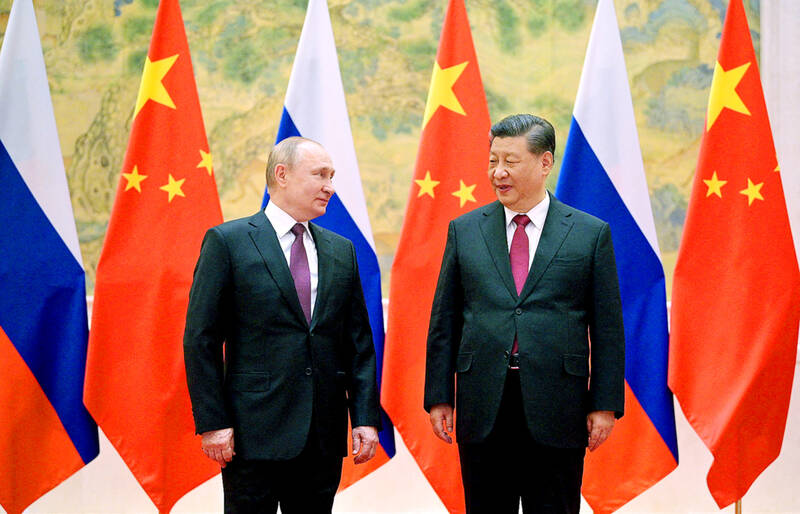Chinese President Xi Jinping (習近平) is to visit Russia from Monday to Wednesday, an apparent show of support for Russian President Vladimir Putin amid sharpening tensions with the West over Moscow’s invasion of Ukraine and the latest sign of Beijing’s emboldened diplomatic ambitions.
The Ukraine war is expected to dominate Putin and Xi’s discussions.
China has refused to condemn Moscow’s aggression and sought to project itself as neutral in the conflict, even while Beijing last year declared that it had a “no-limits” friendship with Russia.

Photo: REUTERS
China and Russia yesterday announced Xi’s trip to Moscow, shortly after Chinese Minister of Foreign Affairs Qin Gang (秦剛) held a teleconference with Ukrainian Minister of Foreign Affairs Dmytro Kuleba, telling him that China has “always upheld an objective and fair stance on the Ukraine issue.”
Xi’s visit is expected to offer a diplomatic shot in the arm for Putin, as Western leaders have sought to isolate him over the war.
China’s refusal to condemn Russia while denouncing Western sanctions and accusing NATO and the US of provoking Putin’s military action has irked Washington as it competes with Beijing for influence.
Kremlin spokesman Dmitry Peskov said that Putin and Xi would have a one-on-one meeting over an informal dinner on Monday, while broader talks involving officials from both countries are scheduled for Tuesday.
Peskov did not provide details about the discussions.
During the war in Ukraine, China has said the sovereignty and territorial integrity of all countries should be respected.
However, it remains unclear whether its position is intended to position China as a neutral peacemaker or suggests Beijing sympathizes with Moscow’s claims to seized Ukrainian territory.
Ukraine has listed Russia’s withdrawal from the occupied areas as the main condition for peace.
After the call with Qin, Kuleba wrote on Twitter: “I underscored the importance of [Ukrainian President Volodymyr Zelenskiy’s] peace formula for ending the aggression and restoring just peace in Ukraine.”
Kuleba later in the day spoke with US Secretary of State Antony Blinken.
Beijing’s apparent deeper dive into Ukraine issues follows its success in brokering talks between Iran and Saudi Arabia.
Last week, the two countries agreed to restore their diplomatic ties after years of tensions.
The agreement cast China in a leading role in Middle Eastern politics, a part previously reserved for long-time global heavyweights such as the US.
On the back of the Iran-Saudi Arabia deal, Xi called for China to play a bigger role in managing global affairs.

DEFENDING DEMOCRACY: Taiwan shares the same values as those that fought in WWII, and nations must unite to halt the expansion of a new authoritarian bloc, Lai said The government yesterday held a commemoration ceremony for Victory in Europe (V-E) Day, joining the rest of the world for the first time to mark the anniversary of the end of World War II in Europe. Taiwan honoring V-E Day signifies “our growing connections with the international community,” President William Lai (賴清德) said at a reception in Taipei on the 80th anniversary of V-E Day. One of the major lessons of World War II is that “authoritarianism and aggression lead only to slaughter, tragedy and greater inequality,” Lai said. Even more importantly, the war also taught people that “those who cherish peace cannot

STEADFAST FRIEND: The bills encourage increased Taiwan-US engagement and address China’s distortion of UN Resolution 2758 to isolate Taiwan internationally The Presidential Office yesterday thanked the US House of Representatives for unanimously passing two Taiwan-related bills highlighting its solid support for Taiwan’s democracy and global participation, and for deepening bilateral relations. One of the bills, the Taiwan Assurance Implementation Act, requires the US Department of State to periodically review its guidelines for engagement with Taiwan, and report to the US Congress on the guidelines and plans to lift self-imposed limitations on US-Taiwan engagement. The other bill is the Taiwan International Solidarity Act, which clarifies that UN Resolution 2758 does not address the issue of the representation of Taiwan or its people in

Taiwanese Olympic badminton men’s doubles gold medalist Wang Chi-lin (王齊麟) and his new partner, Chiu Hsiang-chieh (邱相榤), clinched the men’s doubles title at the Yonex Taipei Open yesterday, becoming the second Taiwanese team to win a title in the tournament. Ranked 19th in the world, the Taiwanese duo defeated Kang Min-hyuk and Ki Dong-ju of South Korea 21-18, 21-15 in a pulsating 43-minute final to clinch their first doubles title after teaming up last year. Wang, the men’s doubles gold medalist at the 2020 and 2024 Olympics, partnered with Chiu in August last year after the retirement of his teammate Lee Yang

The Philippines yesterday criticized a “high-risk” maneuver by a Chinese vessel near the disputed Scarborough Shoal (Huangyan Island, 黃岩島) in a rare incident involving warships from the two navies. The Scarborough Shoal — a triangular chain of reefs and rocks in the contested South China Sea — has been a flash point between the countries since China seized it from the Philippines in 2012. Taiwan also claims the shoal. Monday’s encounter took place approximately 11.8 nautical miles (22km) southeast” of the Scarborough Shoal, the Philippine military said, during ongoing US-Philippine military exercises that Beijing has criticized as destabilizing. “The Chinese frigate BN 554 was